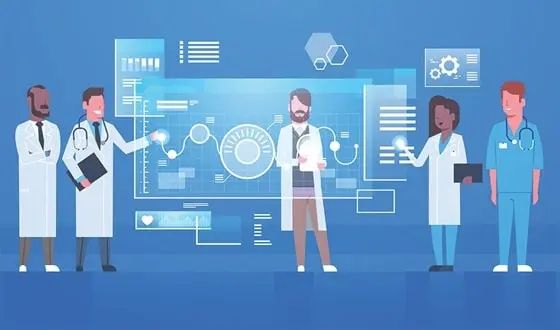Leveraging Business Tech for Career Growth in the Medical Industry: A Guide for Aspiring Leaders
In today’s rapidly evolving healthcare landscape, the intersection of business technology and medical practice is becoming increasingly significant. As the industry undergoes a digital transformation, the ability to navigate and leverage business technology is no longer just an added advantage—it is a crucial skill set for those looking to advance their careers in the medical field. Whether you’re a healthcare administrator, a medical professional, or a business leader in the medical industry, understanding and utilizing business tech can open doors to leadership roles and other career advancements.
This article explores how professionals in the medical industry can harness business technology to enhance their career prospects, focusing on the key technologies shaping the industry and the strategies for integrating them into your professional development.
The Growing Importance of Business Technology in Healthcare

Due to healthcare’s complexity and regulatory nature, the medical industry has traditionally been slower to adopt new technologies than other sectors. However, this trend is changing rapidly. Business technologies like data analytics, telemedicine platforms, and electronic health records (EHR) systems are now at the forefront of healthcare innovation. These tools are not only improving patient care but are also revolutionizing the way medical facilities operate, driving efficiency, reducing costs, and enabling better decision-making.
Staying tech-savvy is becoming essential for medical professionals. Understanding and implementing these technologies can differentiate you from your peers and position you as a forward-thinking leader capable of navigating the complexities of modern healthcare.
Mastering Data Analytics for Strategic Decision-Making
Data analytics is one of the most powerful tools reshaping the healthcare industry. With the vast amounts of data generated daily—from patient records to operational metrics—being able to analyze and interpret this data is crucial for making informed decisions that enhance patient outcomes and optimize business operations.
Gaining proficiency in data analytics can be a significant advantage for those looking to advance their careers. Understanding how to extract actionable insights from data can help you identify trends, predict outcomes, and develop strategies that align with your organization’s goals. Moreover, communicating these insights effectively to non-technical stakeholders is a skill highly valued in leadership roles.
To leverage data analytics for career growth, consider the following steps:
- Invest in Training: Enroll in courses that focus on healthcare analytics, data visualization, and business intelligence. Familiarize yourself with popular tools like SQL, Tableau, or Power BI.
- Apply Analytics to Your Role: Analyze data within your current role. Whether it’s patient outcomes, operational efficiency, or financial performance, find ways to use data to improve processes or support decision-making.
- Build a Portfolio: Document your analytics projects and their impact. This portfolio can be a powerful tool when seeking promotions or new opportunities.
Embracing Telemedicine and Digital Health Platforms
Telemedicine and digital health platforms have seen unprecedented growth, especially in response to recent global events that have accelerated the adoption of remote healthcare solutions. These technologies enable healthcare providers to deliver care remotely, improving access to medical services and enhancing patient engagement.
Understanding how to implement and manage telemedicine platforms is increasingly essential for medical professionals and business leaders in healthcare. Proficiency in these technologies improves patient care and positions you as a leader in a rapidly expanding field.
To integrate telemedicine into your career advancement strategy:
- Understand the Technology: Familiarize yourself with the different telemedicine platforms and their functionalities. This includes understanding the technical requirements, patient privacy concerns, and the regulatory landscape.
- Promote Integration: Advocate for the adoption of telemedicine within your organization. Highlight its benefits, such as increased patient access, reduced overhead costs, and improved patient satisfaction.
- Develop Digital Health Strategies: Develop strategies that integrate telemedicine with traditional healthcare services, ensuring a seamless experience for patients and providers.
Use Electronic Health Records (EHR) for Operational Excellence
Electronic Health Records (EHR) systems are central to the digital transformation of healthcare. These systems streamline patient information management, reduce errors, and facilitate better coordination of care. Mastering EHR systems is a must for professionals looking to advance in the medical industry.
Understanding how to optimize EHR use can significantly improve operational efficiency, compliance with regulatory standards, and patient outcomes. Additionally, being proficient in EHR management can make you a key player in strategic planning and operational leadership.
To leverage EHR systems for career growth:
- Deepen Your EHR Knowledge: Gain a thorough understanding of your organization’s EHR system. This includes learning about its features, capabilities, and best practices for maximizing its effectiveness.
- Improve Workflow Integration: Identify ways to integrate EHRs into existing workflows to enhance efficiency. Work with IT and medical staff to ensure the system supports rather than hinders patient care.
- Advocate for Continuous Improvement: EHR systems are continually evolving. Stay updated on new features and advocate for their implementation to improve patient care and operational efficiency.
Positioning Yourself for Leadership in the Medical Industry
As the medical industry embraces digital transformation, the demand for professionals bridging the gap between healthcare and business technology will only grow. By mastering key business technologies, you can enhance your own career prospects and contribute to the overall advancement of your organization.
Here are some final tips for positioning yourself as a leader in this tech-driven environment:
- Stay Informed: The landscape of healthcare technology is constantly changing. Stay informed about the latest developments and consider obtaining certifications in relevant technologies.
- Network with Tech and Healthcare Leaders: Build connections with professionals in the tech and healthcare sectors. Networking can open doors to new opportunities and collaborations.
- Be a Change Agent: Embrace innovation and be a driving force for change within your organization. Demonstrating your ability to lead technology-driven initiatives can solidify your reputation as a forward-thinking leader.
Navigating Your Career as a Medical Leader
Leveraging business technology is key to career advancement in the ever-evolving medical industry. By mastering data analytics, telemedicine platforms, and EHR systems, you can position yourself as a leader capable of driving innovation and improving healthcare outcomes. Embrace these technologies, stay informed, and take proactive steps to integrate them into your career development strategy. The future of healthcare is digital, and those who harness the power of business tech will be at the forefront of this transformation.


